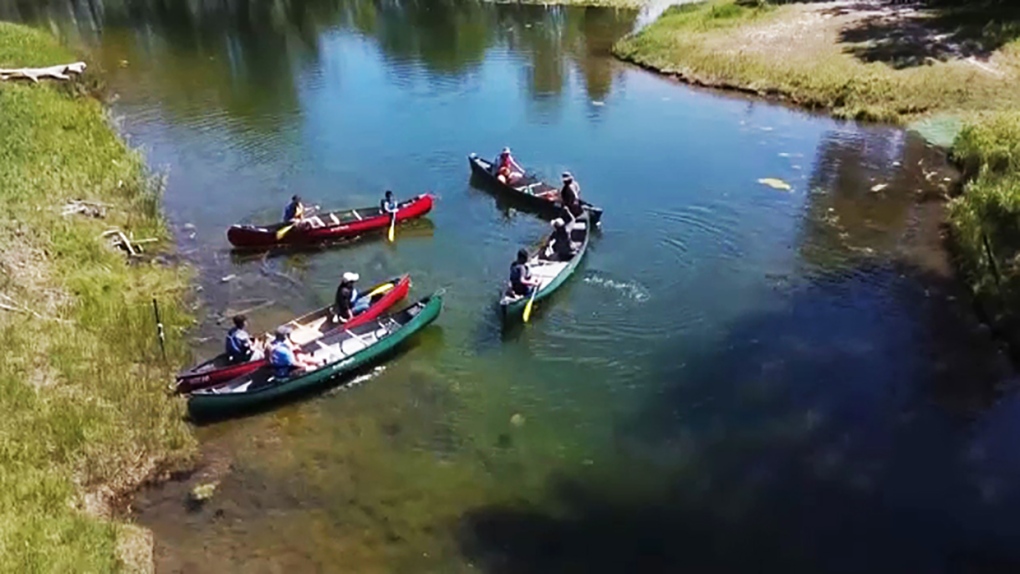New Canadians learning skills and belonging through Learn to Paddle program
Some nights there are as many as 20 people gingerly stepping into the canoes at Carburn Park, their first experience in a water craft that has connected this vast land for more than 1,000 years.
Participants are signed up through Immigrant Services Calgary, and qualified paddling instructors walk them through everything from putting on a life jacket and getting in and out safely, to draws, pries and j-strokes.
"When newcomers come to Canada, we are worried about housing, employment and the recreational doesn't always come first," said Erika Tam with Immigrant Services Calgary.
"They need to find a new identity of how they are in Canada, so canoeing is one of the ways of integrating," Tan said.
Learning to paddle is also a way for some to connect with new friends. Eunice Olorunleke said she wants to go camping, but felt she needed to develop some comfort on the water and some basic skills.
 Canadian newcomers learn how to canoe
Canadian newcomers learn how to canoe
"I said: 'Okay. Let me just try," Olorunleke says. "I would love to travel with them to go camping, so I said let me just come and learn how to paddle so that I can go with them."
The lessons are free, part of a federal grant program given to Canoe Kayak Canada. Local clubs Rocky Mountain Paddling Centre, Bow Waters Canoe Club and Waterwerks Kayak Club provide a mix of equipment and instructors.
The learn to paddle program has only one more session this year.
Canoes can be rented in Calgary for as little as $25 a day, making them a fun and affordable option for families.
CTVNews.ca Top Stories

Canadian Olympic Committee CEO says soccer coach Bev Priestman likely aware of spying
Canadian Olympic Committee chief executive officer David Shoemaker says the head coach of the national women's soccer team was likely aware drones were used to spy on another team's practices in France.
Arson attacks paralyze French high-speed rail network hours before start of Olympics
France's high-speed rail network was hit Friday with widespread and "criminal" acts of vandalism including arson attacks, paralyzing travel to Paris from across the rest of France and Europe only hours before the grand opening ceremony of the Olympics.
DEVELOPING Recent rain, cooler weather limiting spread of wildfires in Jasper National Park
Cool and wet weather is making a difference in Jasper National Park.
Harris pushes Netanyahu to ease suffering in Gaza: 'I will not be silent'
U.S. Vice President Kamala Harris pressured Israeli Prime Minister Benjamin Netanyahu on Thursday to help reach a Gaza ceasefire deal that would ease the suffering of Palestinian civilians, striking a tougher tone than President Joe Biden.
Mary-Ellen Turpel-Lafond likely has Indigenous DNA: report
The Law Society of British Columbia says a DNA test shows a former judge and Order of Canada recipient accused of falsely claiming to be Cree "most likely" has Indigenous heritage.
Stay inside, filter indoor air amid wildfire smoke, respirologist says
A Calgary respirologist is advising people to regularly check the outdoor air quality and stay inside as smoke from the Jasper wildfires blows into other parts of Alberta and possibly beyond.
Canada to bring home fewest Olympic medals since 2012, according to forecaster
Fewer Canadians are expected to reach the Paris podium than in the previous two Olympic Summer Games, a global data analytics company predicts.
Yukon woman narrowly escapes bear attack, credits hair clip
A woman in Yukon believes her hair clip helped save her during a bear attack.
Prince William's 2023 salary revealed in new report
Newly released financial reports show that William, the Prince of Wales, drew a salary of $42.1 million last fiscal year, his first since inheriting the vast and lucrative Duchy of Cornwall.

































